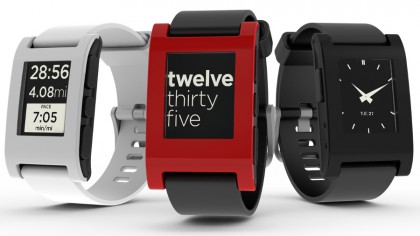How your business can use wearable technology now
What opportunities do wearable platforms offer?
To gain an insight into how wearables could impact on small business, TechRadar Pro spoke with Neil Pickering, Director at Kronos. We began by asking whether there is a legitimate business case for wearables at the moment?
"Wearable technology provides a simple – and effective – way to help businesses manage their workforce more effectively. Unlike the consumer world, wearable technology for businesses is not about fashion, but function. It's about extracting information from employees, or devices, with minimal, or ideally, no impact on their working behaviour. Currently most organisations are just starting to learn about wearable technology or to think of it as a workplace tool, but its potential within the organisation is huge."
Are there any opportunities with wearable technologies that small businesses can take advantage of?
"Wearable technology can provide managers with a clear understanding of what their staff are doing at any time throughout the day, with minimal effort," Neil said. "As a result, SMBs can benefit from reduced costs, increased efficiencies and a more nimble, productive workforce of employees better able to deliver superior goods and services.
"For example, manufacturing employees could wear a smart wristband that communicates their location on the floor at all times. This could combine the location-tracking functionality with data associated with traditional manufacturing punches to provide managers with instant information about the employee's work. For instance, what are they working on? Are there productivity issues? Are they falling behind? Armed with this information, supervisors can react in real-time to potential issues and optimise business outcomes."
What advice would Neil give to a small business owner who was looking closely at what wearable technologies could offer them?
"Getting employees to use wearable devices could be perceived as an attempt to monitor them or intrude on their privacy, so it's important that privacy and security are included as part of the initial discussions around wearable tech. Businesses need to have an honest discussion with employees explaining what the data needs to be used for, and ensure barriers are built in to separate work and home lives.
Are you a pro? Subscribe to our newsletter
Sign up to the TechRadar Pro newsletter to get all the top news, opinion, features and guidance your business needs to succeed!
"In these discussions it's vital that organisations explain what the employee gets out of it. It's easy to believe that people won't like it – that such systems act as 'big brother'. But in reality nothing could be further from the truth. Most workers are comfortable with the notion of being monitored, as long as the reasons for doing so, and the benefits to the business and employees, have been clearly discussed and explained."
How does he see wearable technologies developing over the next few years? Will more small business opportunities emerge?
"For the most part, wearable technology is still in the trial or concept phase," Neil concluded. "But as connectivity continues to improve, the technology is only going to get better and more prevalent in the months and years ahead. In order to take full advantage of what this new technology has to offer, SMBs should start putting in place plans now, or they'll only find themselves behind those organisations that do."

Time for wearables
The time is now when it comes to wearables. "It is time to get started now to get in on the gold rush," said Ennio Carboni, Executive Vice President, Customer Solutions, Ipswitch. "The wearable market is in its infancy, but it will grow very rapidly. For example, market research conducted by Canalys has estimated that 17 million wearable bands will be shipped this year alone.
"Consumer applications such as wearable cameras, activity trackers, smart clothing, smart glasses and smartwatches are set to explode on to the market and consumers are hungry for them. Small businesses are missing a huge opportunity to innovate and get ahead. Already, powerful apps are being created that improve business operations and enhance customer experience."
Dan Todaro, MD at Gekko, concluded: "We will laugh at this discussion sooner than you think as wearables become literally the fabric of our life within the decade. In ten years' time we'll start to look at tablets the way we look at desktop computers now. Clunky, archaic and heavy.
"The opportunities are already there for small businesses and can only grow. The important thing is to make sure small businesses aren't waiting for someone to come along and tell them precisely how wearable tech can enhance their business. It's up to businesses to be innovative."